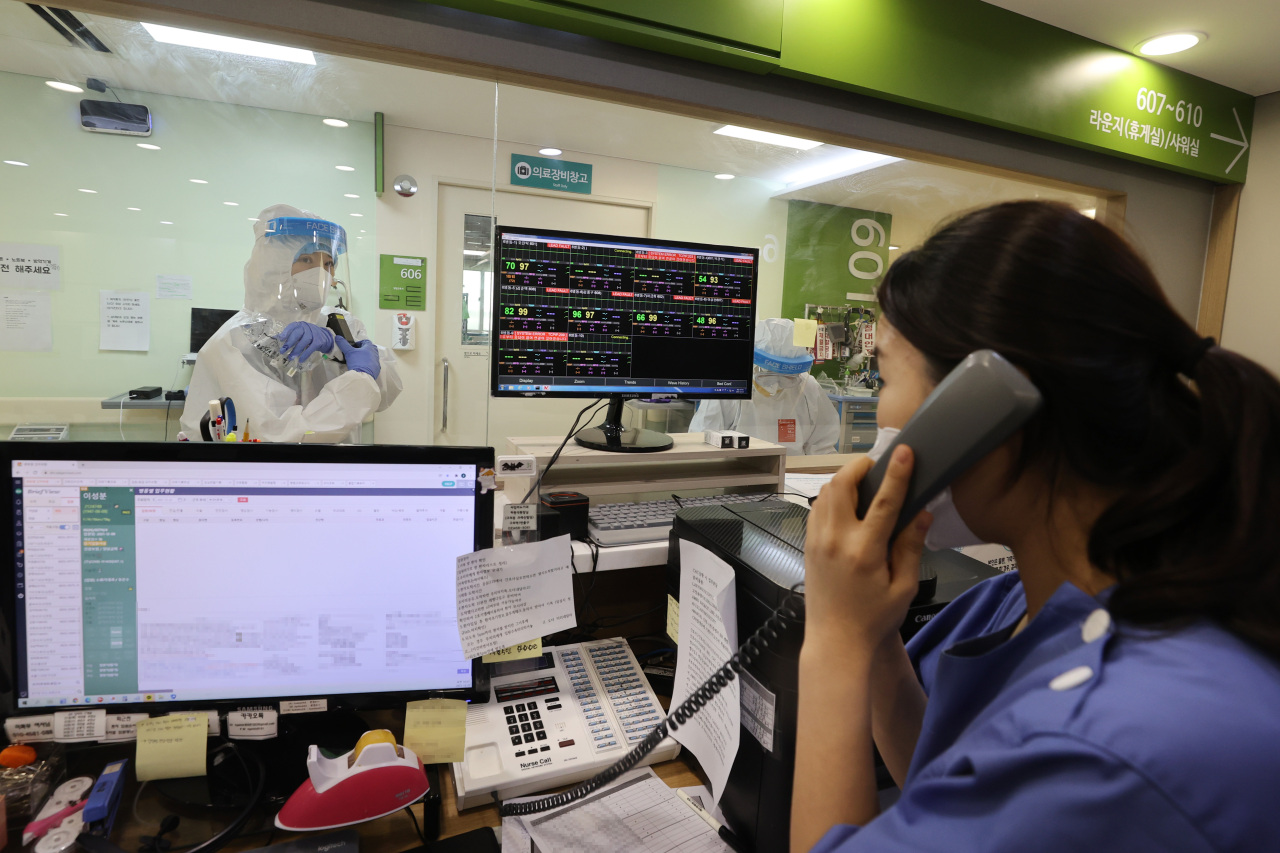 |
This photo taken Thursday shows COVID-19 medical personnel at a hospital in Gwangjin, Seoul`s eastern district. On this day 85.1 percent of all intensive care COVID-19 beds remained occupied in Seoul area. (Yonhap) |
The South Korean government is ordering COVID-19 patients out of intensive care units as hospitals across the country continue to face a severe shortage of beds.
The executive orders were issued Wednesday afternoon to 210 patients who have been hospitalized in COVID-19 ICUs for longer than 20 days, the Ministry of Health and Welfare confirmed Thursday. The ministry said 71 patients have been moved to non-COVID-19 ICUs or other “step-down” beds providing less intensive care accordingly as of Thursday morning. Patients failing to abide by the order were subject to a fine of up to 1 million won ($842).
Wednesday’s orders follow protests from doctors over the 20-day ICU discharge rule for COVID-19 patients now in effect. The ministry had told hospitals last week that the length of ICU stay for COVID-19 patients would be limited to 20 days at most -- after which point patients would no longer be waived of their medical bills related to COVID-19 treatment and hospitals would lose aid.
Medical groups, including the Korean Society of Critical Care Medicine and the Korean Medical Association, have decried the measures as jeopardizing patient safety. Some patients were not well enough to be moved on day 20, they said. Since most wards at Korean hospitals have multiple beds, placing recovering COVID-19 patients in a nonisolation setting could expose other patients to infection.
Front-line doctors are now asked to provide proof as to why a patient might need to stay hospitalized longer than the time permitted by the government, according to Dr. Eom Joong-sik, an infectious disease specialist at Gachon University Medical Center, a state-designated COVID-19 hospital.
Eom said despite the penalties such as withdrawal of financial aid for patients staying longer, following through with the orders would not always be feasible. “I understand that these are wartime decisions. But I’m also saying that it will be hard to go through with it knowing it could risk lives being lost.“
The ministry rationale for the new rules is that they would help ease the ongoing hospital bed crisis. Around 80 percent of all intensive care COVID-19 beds were occupied by Wednesday at midnight. In Seoul and cities nearby, the occupancy rate was higher at 85 percent.
Park Hyang, a senior Health Ministry official, told reporters in a closed-door briefing that the orders had basis on laws pertaining to infectious disease control and prevention. But whether to still charge a fine in exceptional circumstances was “being discussed.”
Korea once again broke records for COVID-19 deaths on Thursday, six days since the pause on President Moon Jae-in’s return to normal plan that left almost no restrictions for over a month and a half.
On Wednesday, the number of deaths attributed to COVID-19 reached 109, crossing the 100 mark for a one-day toll for the first time. Over the past week, an average of 71 people died of COVID-19 each day. In the final week of October, right before the Nov. 1 return to normal, the average number of daily deaths was 12.
According to data the Korea Disease Control and Prevention Agency submitted to the main opposition People Power Party Rep. Her Euna’s office, at least 52 people died while waiting for a hospital bed between Nov. 1-Dec. 18.
By Kim Arin (
arin@heraldcorp.com)








